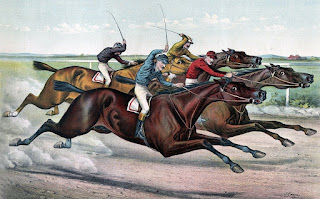Jockeys in national hunt races face a range of risks and challenges due to the nature of the sport. While every effort is made to prioritize safety, the inherent factors of jumps racing present unique hazards. Here are some of the risks and challenges faced by jockeys in national hunt races:
Falls and Injuries: Jockeys are at risk of falls during races, particularly when negotiating jumps. Falls can result in a variety of injuries, ranging from minor bruises and fractures to more severe injuries such as concussions, spinal injuries, or even fatalities. The combination of high speeds, challenging obstacles, and the potential for interference from other horses increases the risk of accidents.
Jumps-Related Hazards: The presence of hurdles and fences poses additional risks. Jockeys must navigate these obstacles while maintaining balance and control. Mistiming a jump or encountering an obstacle at an incorrect distance can lead to falls or unseating from the horse.
Weather and Track Conditions: Adverse weather conditions and varying track surfaces can add complexity and risk to races. Soft ground can make the going more demanding, increasing the likelihood of slips and falls. Conversely, firm ground can result in harder landings and increase the risk of injuries upon impact.
Competitor Dynamics: National hunt races involve multiple horses competing for limited space on the track. This can create a challenging and competitive environment, with the potential for collisions, interference, or riding incidents. Jockeys must anticipate and respond to the actions of other riders while maintaining their own race strategy.
Fitness and Weight Management: Jockeys undergo rigorous physical training and must maintain a specific weight to ride in races. The demands of maintaining weight while remaining physically fit can pose challenges to jockeys, affecting their overall well-being and potentially increasing the risk of injury.
Mental Pressure and Decision-Making: Jockeys face intense mental pressure during races, requiring split-second decision-making. They must assess race dynamics, adjust tactics on the go, and make judgments on pace, positioning, and jumping technique. The need to make quick and accurate decisions adds to the mental and psychological challenges faced by jockeys.
Recovery and Resilience: Injuries and setbacks are common in racing. Jockeys must have the resilience to bounce back from injuries, both physically and mentally. Rehabilitation and recovery can be demanding, requiring dedication and determination to regain fitness and return to racing.
It's important to note that while these risks exist, measures are in place to mitigate them. Continuous efforts are made to improve safety standards, track conditions, equipment, and jockey welfare programs to minimize risks and ensure the well-being of jockeys in national hunt races.
Photo: Pixabay (free)

No comments:
Post a Comment
Thanks for your comment.